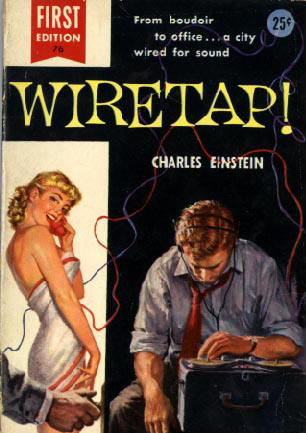
This will stop dead in their tracks nasty people like whistle blowers and those who protest good things like totalitarianism. I feel safer already! Don’t you? (My sensors will tell me if you agree.)
Reminder: Monday is Wiretap the Internet Day
May 14th is the official deadline for cable modem companies, DSL providers, broadband over powerline, satellite internet companies and some universities to finish wiring up their networks with FBI-friendly surveillance gear, to comply with the FCC’s expanded interpretation of the Communications Assistance for Law Enforcement Act.
Congress passed CALEA in 1994 to help FBI eavesdroppers deal with digital telecom technology. The law required phone companies to make their networks easier to wiretap. The results: on mobile phone networks, where CALEA tech has 100% penetration, it’s credited with boosting the number of court-approved wiretaps a carrier can handle simultaneously, and greatly shortening the time it takes to get a wiretap going. Cops can now start listening in less than a day.
It’s worth noting that the new requirements don’t alter the legal standards for law enforcement to win court orders for internet wiretaps. Fans of CALEA expansion argue that it therefore won’t increase the number of Americans under surveillance.
That’s wrong, of course. Making surveillance easier and faster gives law enforcement agencies of all stripes more reason to eschew old-fashioned police work in favor of spying. The telephone CALEA compliance deadline was in 2002, and since then the amount of court-ordered surveillance has nearly doubled from 2,586 applications granted that year, to 4,015 orders in 2006.
Want to check out the CALEA website? How about the FCC’s site for it?
And here’s the EFF’s take:
When special interests like law enforcement commandeer the marketplace, innovation suffers. The NPRM suggests that all devices that provide broadband connectivity will have to be CALEA-compliant, which would severely limit the scope of high-tech research and development. Today’s VoIP systems — revolutionary software tools that allow people to make phone calls over the Internet — would likely never have been developed in an environment where all products had to go through a CALEA-compliance test before making it to market. While the NPRM does not extend CALEA to providers of peer-to-peer VoIP, email and Instant Messaging, it seeks comment on whether other laws might give the FCC power over a wider array of technologies.















Yes, we certainly need to give more power to the FCC. Eventually they should have control, through the FBI, over all communication. For example, pillow talk is a notorious channel of spillage for government secrets. Monitoring is needed for national security.
Wow….now they don’t even need to be out in their cars. They can sit at their computers eating donuts.
[censored] me over tenfold.
Hmm I wonder how much the RIAA and MPAA are involved with this.